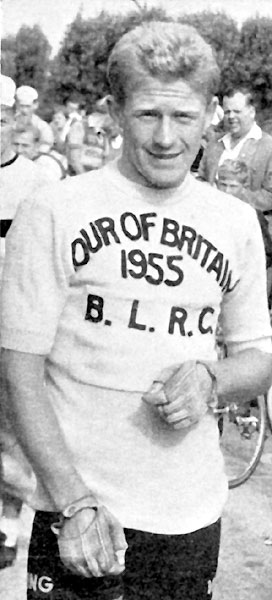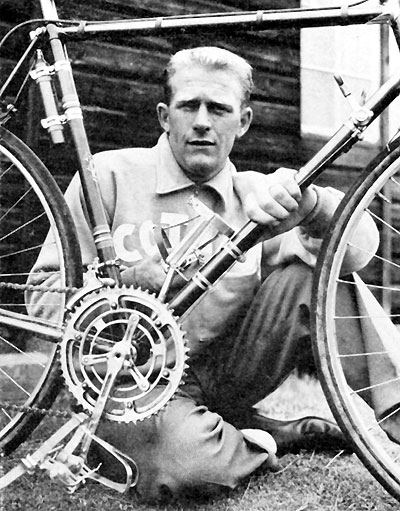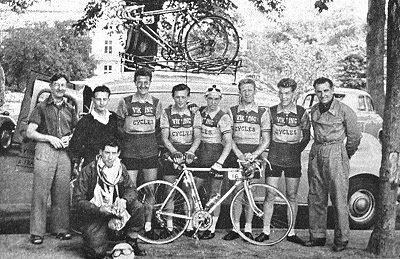1950s Biographies - Joe Christison
|
Joe Christison’s Two Lost Chances
by Russell Galbraith
Coureur Sporting Cyclist, April 1960
|
|
FIVE years ago Joe Christison was told that if he went to France for the Grand Prix des Nations he could finish in the first ten of this classic of all classic cycling time trials.
The man who said so was J. B. Wadley. Christison, one of the finest all-rounders Scotland has produced, and then an independent, had just won the time trial stage of the 1955 Tour of Britain. He had started the tour in grand style, winning the first stage, and at the race finish in London he was fifth on general classification.
His victims in the time trial included Belgian Henri Guldemont. A high placing in the Nations could have proved the turning point in his career. He could not persuade his sponsor to finance the trip and the opportunity was lost.
This was the second major disappointment of Christison's career. In 1953, while still an amateur, he was invited to attend the Simplex training camp in France, where so many of today's stars, including Irishman Shay Elliott, were first put on the golden road to success. But still in the RAF, Christison was refused permission to travel.
Today he believes that if he had been allowed to go to the camp, or if he had been given a chance to do well in the Grand Prix des Nations two years later, he might have made the grade as a professional.
"Certainly I would have tried to the limit of my ability," Christison told me when we discussed his "lost" career. "I might have been lucky, but if not then at least I would have had the satisfaction of knowing that I was able to try."
|
|

|
|
Joe Christison in Leader’s Jersey; 1955 Tour of Britain
|
|
But looking back on the highlights of Christison's career, both as an amateur and as an independent, it seems that he has had more than his share of bad luck.
Few riders, I think, could have suffered the humiliation and disappointment which he had to endure during the 1958 Empire Games at Cardiff and still remained in the sport.
Christison had enjoyed fine form throughout the year. He had ridden well for Britain in the six-day Tour of Poland, had been fifth in the Manx International and was second, behind fellow Scot Ronnie Park, in the Hull Thursday road race.
His Scottish Empire Games selection was automatic on the road. In addition he was invited to ride in the track ten miles. But Christison, a sandy-haired, quiet-spoken, likeable Scot, never knew the joy of pulling his Empire Games vest over his head before either of these events.
A protest was registered that because of his past career as an independent, he was ineligible to compete in the Games.
The row which followed made headlines in the national press for days. Christison became the best known cyclist in the Games - or out of them to be more precise!
In Scotland most clubmen viewed the protest as an English plot to cripple the Scottish team. The S.C.U. fought, of course and even tried to take the case to the U.C.I. for a final, legal ruling - but without success. Twenty-four hours before he was due to ride in the ten at Maindy, Christison was told - "You are out!"
Modest Christison doesn't claim that he could have beaten Ray Booty in the Cardiff road race. He does admit, however, that the course was just right for him. He was also in form. And an on-form Christison is a danger in any company.
He has proved this many times - on his home roads around Edinburgh and in other parts of Scotland . . . in England . . . in France . . . in Poland . . . in Germany . . . and in Czechoslovakia. And while he has been unlucky at major junctures in his career, Christison has still fashioned a reputation which bears comparison with the best in Britain.
He rode in his first event in February, 1949. This was an inter-club 25 between members of the Comet R.C., which Christison joined in 1948, and near neighbours Musselburgh R.C. His clubmate Ian Greenfield, also destined to find fame in the Tour of Britain in the brief, glory days of full sponsored teams in this country, won the event with 1-11. Christison was third with 1-13. |
|
B.L.R.C.-style road racing flourished in Scotland under the banner of the old S.C.U. then and time trials were controlled by the now defunct S.A.C.A. The Comet R.C. had S.C.U. affiliation and there was plenty of opportunity for young Christison to find his road racing legs.
During 1950 he won 16 junior road races as well as six time trials. Two years later, and by now serving a three-year engagement with the RAF, he had developed from the indisciplined frenzy of those junior events to the more skilful cut and thrust of senior competition.
In 1952 he also had his first taste of big-time amateur stage racing. He chose a tough school in which to begin: the B.L.R.C.'s long-standing classic Brighton to Glasgow.
But Christison, always prepared to swap pedal revs with anyone, won the toughest stage, from Wolverhampton to Bradford, and finished 19th on general classification, despite losing ten minutes on stage two with an injured arm.
That same year he was selected to ride in the R.A.F. team in the Ken Russell-won Tour of Britain. Christison, who finished 20th and was second amateur, has two big memories from his debut in the round-Britain event.
The first was his surprise at finding that he was just as fit, and just as good, as the independents - all he lacked was experience.
The second was the courage of Bill Bellamy, of Romford, who had won the Brighton to Glasgow event, in which Christison started his stage-racing career.
In the Tour of Britain, Bellamy overshot the road on the Newcastle to Scarborough stage and finished the stage with a broken back. Lifted on to his machine by his helpers, the extent of his injuries was not discovered until he was X-rayed later that night. A year later the Romford rider returned to the Tour of Britain once again and rode with distinction.
Christison missed the all-independent tour in 1953; but looking back on his career, he still maintains “This was my best year ever."
It began with a succession of early season time-trial victories. But in his first road race of the new season, at Dundee, Christison took a thrashing. This event was won by one - John Burrowes, now better known as the Australian correspondent of "Sporting Cyclist" !
Then Christison struck form and a succession of fine rides followed. He was first in the Chryston road race, four minutes ahead of his nearest rival ; first in the East of Scotland road race championships, a title he has won three times, including 1949 when he was junior champion; first in the Dundee-Glasgow-Dundee two-day ; first in the White Heather Coronation road race; first in the Scottish road race championship, with John Kennedy second ; and first in the R.A.F. five-day in which Ron Coe was second.
|
|

|
|
Joe Christison (1933, Scotland - ???)
|
|
Then followed his invitation to the Simplex camp and that first big disappointment when the RAF refused to let him go. A year later the Service made partial amends by sending him to race in France.
The occasion was the three-day Tour d'Ile de France in which the RAF was represented by Christison, Owen Blower, John Pound and John Chance. This was Christison's last race as an amateur and he finished the tour in 23rd place, highest of the R.A.F. team, with Blower eight places behind and Pound and Chance 48th and 49th respectively. A week later Christison turned independent to ride for Viking in the Tour of Britain.
Frenchman Eugene Tamburlini won the tour. Christison was fourth. In his own words he would have been third - "if Dave Bedwell hadn't ridden the last hill to the finish at Alexandra Palace at 60 miles an hour!"
At the start of the last 120 miles stage from Bournemouth, Christison was in third place on " general." Bedwell was seventh. But tiny, big-sprinting Dave, the personality of so many Tours of Britain, and surely a man who deserved to win one, grabbed the stage winner's two-minute bonus at London, was 31 seconds ahead of Christison on the road - and, at the final count, it was found he had pipped the Scot by 18 seconds for third place.
But with such a promising start to his independent career, Christison had the right to look forward to greater success in 1955. The season started well enough. He was tenth in Dover-London with little training ; fifth in the London-Battle-London. won by Ian Steel ; and first and leader of the winning Viking team in the Bournemouth three-day.
Then he went to Spain for the Vuelta. And nothing Christison had experienced before - or since - has had quite the same effect on him as the heat, the dust or the climbs in that torrid country. Exhausted and completely demoralised. he packed on the fifth day.
"It was a nightmare," he told me. “I couldn't climb the hills and I couldn't sit in the saddle on the flats for boils. Nothing seemed to go right. The heat nearly killed me and I was glad to quit."
The Vuelta was a shattering experience for everyone in the British team with the exception of Christi-son's fellow Scot, Ian Steel. The big Glasgow rider was in tremendous form, especially in the mountains where he was with the ace grimpeurs on the longest climbs, including the sandy, twisting 2,700 feet Alto de la Mata.
Steel was the last of the British team to retire and he only did so because " he was lonely in the bunch and missed having someone to talk to!"
"Steel was easily the best British rider I ever knew, certainly better than Brian Robinson," said Christison. " He had tremendous class, was intelligent in a bunch, great on the hills, and could sprint very well when he had to.
"I am certain that if Ian was still riding today - and in the form which he enjoyed in 1953 when proving himself as good as men like Gaul, De Bruyne and Brankart in the Six Provinces race - he would be a potential winner of the Tour de France in the right team. The tragedy of Ian's career was that he was at his best just those few years too soon." |
|
Christison's form, which suffered badly as a result of his poor showing in Spain, did not return until he had won that first stage of the 1955 Tour of Britain. Then came the super-boost of the time trial stage victory and hearing the editor's opinion of what he could do in the Grand Prix des Nations.
His paid career should just have been starting . . . . instead it was almost finished. The blow came when Viking, in common with other major manufacturers, withdrew their support from racing. Christison could not afford to go to the continent and risk everything in a tilt at full professionalism; so he applied for reinstatement as an amateur.
Many people, even in Scotland, were against his reinstatement and in England his performances are still unrecognised by the RTTC. But as Christison held a SCU independent licence - and was never a professional, like Steel - he was legally entitled to return to amateur racing within two years.
But sick of all the trouble and resentment which his reinstatement caused, Christison was never seen at his best in 1956 and had very little success. In 1957, however, when riding for White Heather C.C., he won several races and was third in the Scottish B.A.R. and leader of the winning team. His times were : 2-3 at 50 miles ; 4-14 at 100 miles and 254 miles in a 12.
The following year, with the coming Empire Games in mind, he was early fit and soon winning. Then came his trip to Poland for the Mazowse-Mazury six-day. Christison, unlike most British riders, thrives on pave, a fact he discovered in 1954 when racing in France for the first time. In the Polish tour he was fifth the first day, second on stage three and had every hope of improving his fourth place on general classification when he became ill on stage four, after drinking contaminated water and had to retire.
Back in Britain there was brief delight at his share in Scotland's victory in the team race in the Manx International . . . . then came the gloom of Cardiff and the Empire Games squabbles.
Last year Christison's winter preparation was directed towards gaining a place in the British team for the Warsaw-Berlin-Prague. He was successful and once again his ability to ride the dreadful roads of Central Europe came to his aid.
Nineteenth on general classification at the finish of this great amateur stage race, Christison almost won the stage into Cracow. But coming through a tunnel on to the track finish he was hauled back by the jersey by Roger Vindevogel - the Belgian who won the all-star Scottish Olympic selection race promoted by Glasgow St. Christopher's in 1956. The race judges refused to uphold the British team's protest, but a few days later a newspaper published a picture showing the Belgian fouling the Scot.
This season, for the first time in many years, Christison has no plans for the year. He may not be seen in competition at all. A new job is likely to occupy most of his time. But at 27 he is still young enough and strong enough to hold his place with the best in Britain. It is to be hoped that his career is far from finished.
|
|
If anyone can add any more then please get in touch
|
|

|
|
1955 Tour of Britain - Viking's winning team of riders - left to right: Ian Steel, Ken Jowett, Doug Booker, Joe Christison and Les Gill. Manager Bob Thom is on the far right. Thanks to Bev Parker
|
|
|









